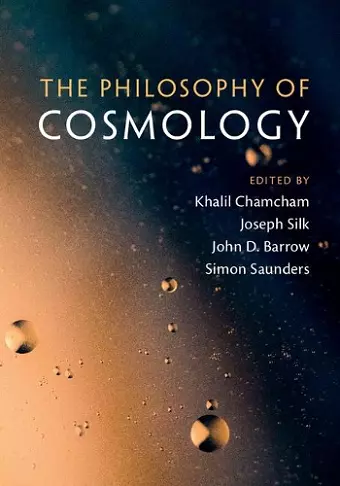The Philosophy of Cosmology
John D Barrow editor Joseph Silk editor Simon Saunders editor Khalil Chamcham editor
Format:Hardback
Publisher:Cambridge University Press
Published:13th Apr '17
Currently unavailable, and unfortunately no date known when it will be back

This book addresses foundational questions raised by observational and theoretical progress in modern cosmology for a broad academic audience.
This book addresses foundational questions raised by observational and theoretical progress in modern cosmology. As the foundational volume of an emerging academic discipline, experts from relevant fields lay out the fundamental problems of contemporary cosmology and explore the routes toward finding possible solutions, for a broad academic audience.Following a long-term international collaboration between leaders in cosmology and the philosophy of science, this volume addresses foundational questions at the limit of science across these disciplines, questions raised by observational and theoretical progress in modern cosmology. Space missions have mapped the Universe up to its early instants, opening up questions on what came before the Big Bang, the nature of space and time, and the quantum origin of the Universe. As the foundational volume of an emerging academic discipline, experts from relevant fields lay out the fundamental problems of contemporary cosmology and explore the routes toward finding possible solutions. Written for graduates and researchers in physics and philosophy, particular efforts are made to inform academics from other fields, as well as the educated public, who wish to understand our modern vision of the Universe, related philosophical questions, and the significant impacts on scientific methodology.
'The editors of this volume boldly announce that this collection of essays by an international group of philosophers and physicists 'marks a beginning' of 'a body of philosophical literature engaged with contemporary cosmology …' Currently, cosmology is at the pinnacle of innovation; its rapid development requires engagement from physicists and philosophers of physics on foundational issues. What is speculative or meta-cosmology today, soon becomes the cosmology of tomorrow as theory struggles to keep up with discovery. Thus, the book begins with a section entitled 'Issues in the Philosophy of Cosmology' and proceeds to delve further into more specialized topics in cosmological structures, gravity, quantum foundations, and 'methodological and philosophical issues'. It should be noted that the quality of the volume's essays varies, as well as the level of technical difficulty; some chapters are remarkably lucid while others are comprehensible only to specialists.' L. B. McHenry, Choice
'This volume, based on a series of workshops and a conference, brings together contributions by cosmologists and philosophers. … many readers will probably use certain chapters as jumping-off points for deeper study, helped by the copious references. At the same time, the chapters are long enough to provide more than a cursory introduction to the topic at hand. Despite the fact that - or perhaps because - cosmology is now a mainly data-driven science, the philosophy of cosmology has become an active but not yet mature field; this book provides a good introduction.' Phillip Helbig, The Observatory
'What is remarkable about this collection of chapters is that it offers a dialogue between two scientific communities, cosmologists/high energy physicists and philosophers of science, that unfortunately do not usually interact enough with each other. … It is not possible to do justice to the number of interesting ideas and proposals presented in this very rich book in a short review. … In summary, this book presents a collection of chapters written by some of the foremost experts in their respective fields. The most interesting of these chapters are those written by scientists who truly tried to build a bridge between philosophy of science and cosmology. Overall, this book is well worth reading as it contains many fascinating perspectives and ideas presented in a very accessible manner for the different communities involved in this project.' Xavier Calmet, Springer Nature
ISBN: 9781107145399
Dimensions: 253mm x 178mm x 27mm
Weight: 1190g
526 pages